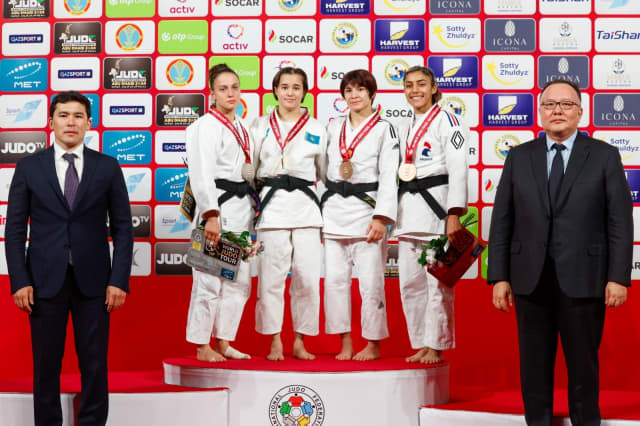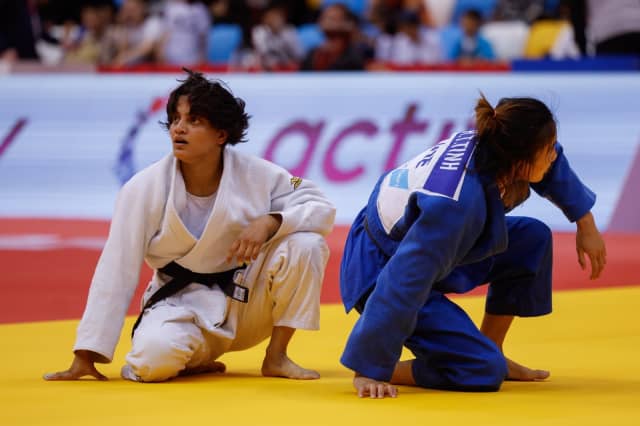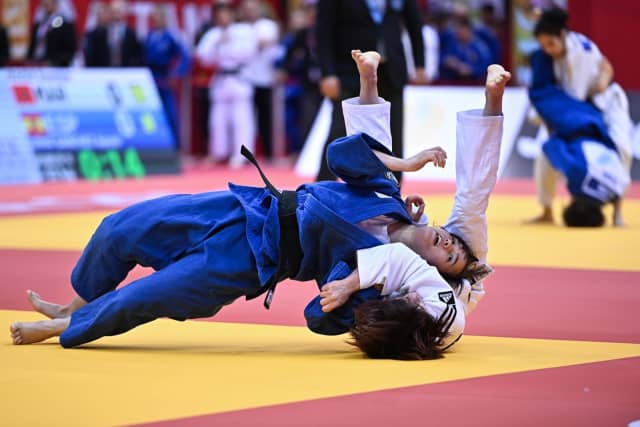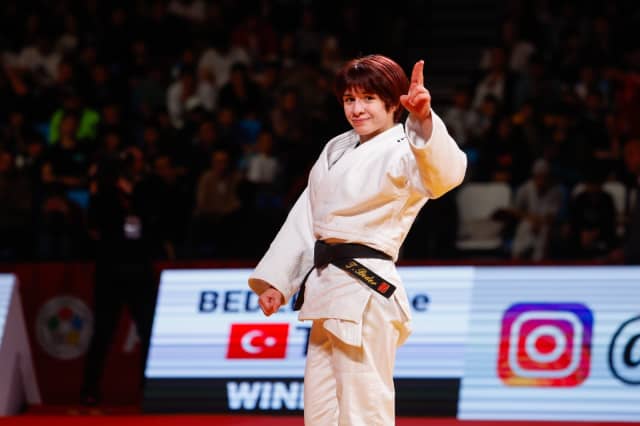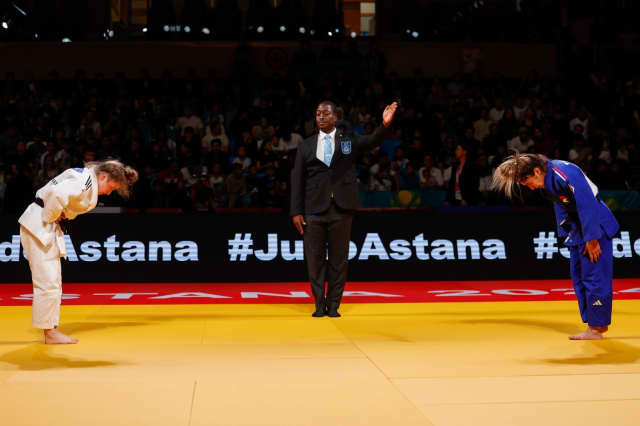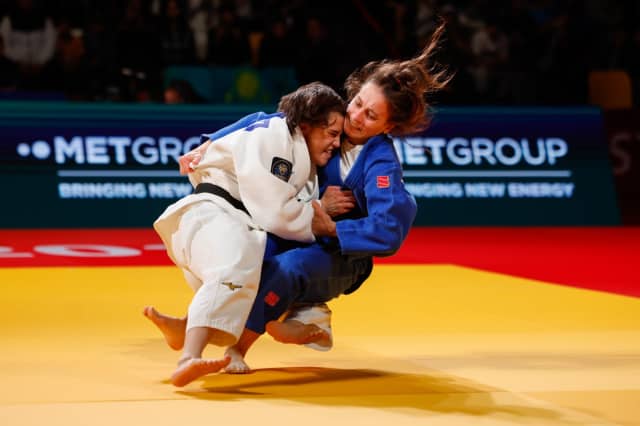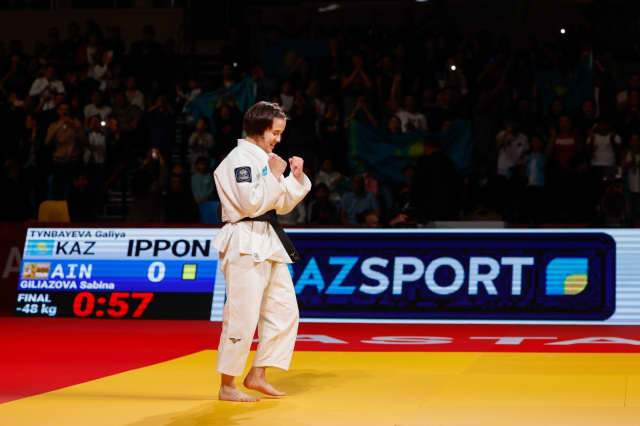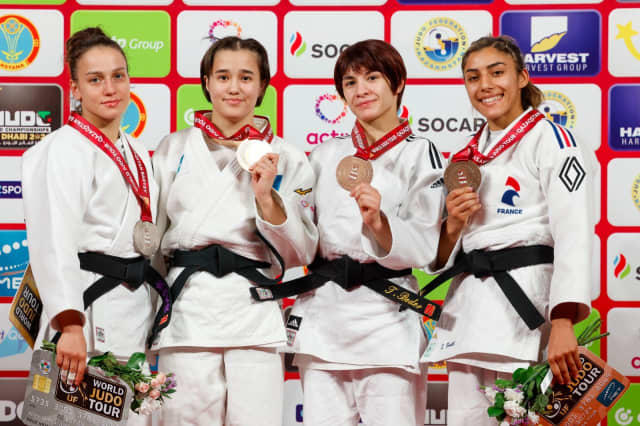Uke-goshi and a te-waza brought the scores in her first contest, sending Tanzer (AUT) back to the locker room early. Then India’s Asmita Dey put up a good fight but eventually succumbed to a loss on penalties.
Actually Dey gave a good performance, beating Hoang (VIE) in round two after a first round bye. An o-uchi-gari applied while under pressure from the kumi-kata of the Vietnamese judoka gave her a score at just the right moment.
Boukli went on to fight recent Tbilisi Grand Slam bronze medallist Zongying Guo (CHN) in the quarter-final and immediately took the advantage, gripping expertly, cancelling any attack or positive strategy the Chinese athlete might have chosen. She then took the expected high right grip and engaged with her own very confident osoto-gari. She made it look easy; not expected at this level. Boukli is not messing around!
Beder (TUR), at the top of pool B, silver medallist in Dushanbe just a week ago, also stuck to the rules of seeding in the first few rounds and flew threw her opponents to the quarter-final, but there she fell to 7th seed and home-ground hero Tynbayeva. An unorthodox combination of o-uchi-gari to ko-soto-gari to kata-guruma gave the spectators the chance to raise their voices and so they did!
Giliazova (AIN) was the third of the top seeds to reach a quarter-final while the last of the top 4, Kurbonova (UZB), became the only one to fall in the preliminaries. Natasha Ferreira (BRA) played the long game to ensure her victory, taking the win on penalties but dominating with an attacking style throughout. It wasn’t good enough though as having passed the number 3 seed she then fell at the feet of Leyla Aliyeva (AZE), a fighter who is getting better all the time, threatening to knock some of the world’s best off their perches. The Azeri had also taken out young Swedish starlet Tara Babulfath and so a place in the semi-final was the least she deserved.
Tynbayeva, riding the wave of support from her crowd, had an uphill climb ahead of her in the Boukli fight but that semi-final seemed to bring her batteries to full charge. The Kazakh didn’t cower for even a second under the French kumi-kata onslaught, finding entries and spaces with great feeling and a powerful resilience. With 6 seconds left on the clock and an otherwise even scoreboard, the two attacked together but a Commission review showed the Kazakh’s ko-soto-gake to be dominant and she was awarded an unchasable waza-ari. Boukli would not top the podium in Astana.
Beder and Aliyeva faced off for the first bronze medal of the category. A high paced contest ensued but the many tomoe-nage attacks from Beder eventually paid off as one scored with just half a minute to go. Aliyeva had to leave without a medal while Beder picked up her fourth grand slam prize.
The second bronze medal was for an upturned Boukli or Spanish judoka Gomez Antona who had beaten Ferreira in the repechage. Although it finished with a waza-ari for the French judoka at full time, from a tomoe-nage, it was much more dominant than that, Boukli not accepting anything the Spaniard offered.
Having passed Aliyeva in the semi-final, it was Giliazova who stood in front of Tynbaeva, a last obstacle between the host nation and their gold! With only 30 seconds of the contest gone, Tynbayeva caught Giliazova with a stunning tani-otoshi for waza-ari and almost did it again a minute later. Giliazova continued to attempt the uchi-mata that put her in the first and second precarious positions. Every uchi-mata from the neutral athlete was met with a threat but she didn't heed the warning and with one minute remaining, Tynbaeva again scored with tani-otoshi from an uchi-mata attempted by Giliazova.
Kazakstan can be proud of their 24 year old dynamo, bringing the first gold medal of this Olympic cycle's last grand slam home.
